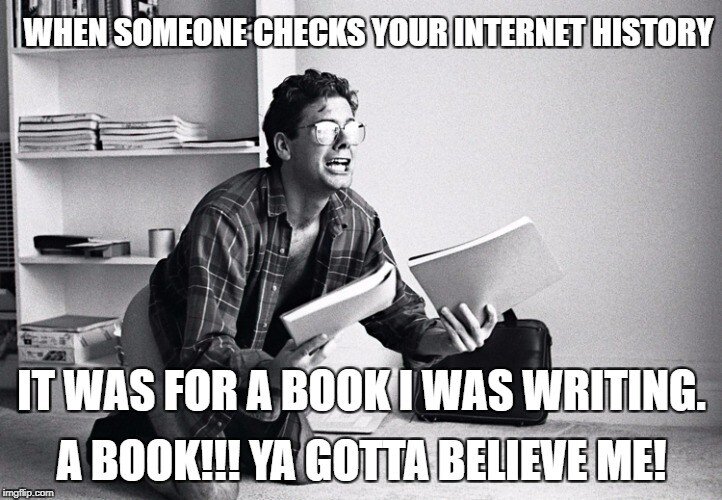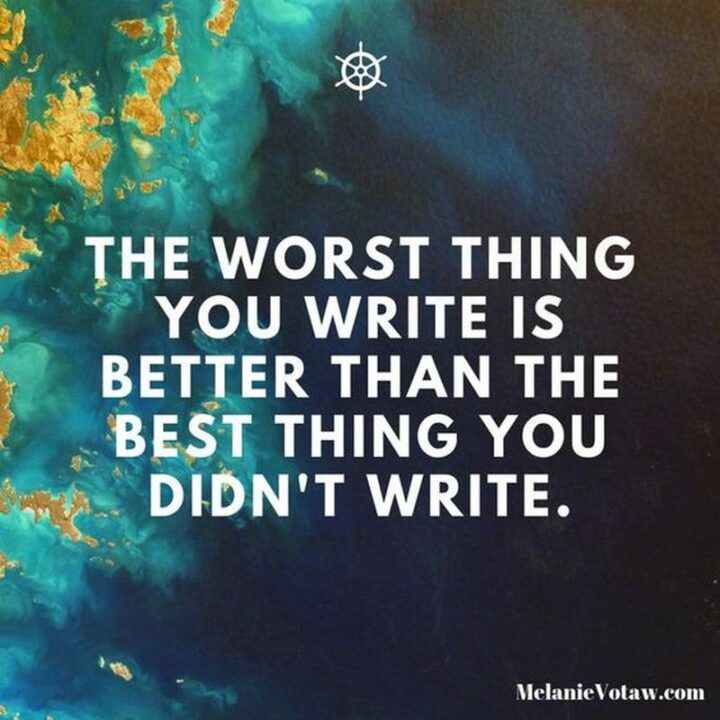I've always been a hard-headed person, someone reluctant to take advice or learn from others without first trying (and often failing) myself. So let me just say that you are more than welcome to ignore what follows. Though I do make some generalizations, they are based upon my knowledge of authors and my experiences in the publishing world. I'm fully aware there are exceptional cases that fly in the face of what I'm about to say. If you're extremely talented and very lucky, success might come quickly. One final caveat: what I'm about to say applies to novels; non-fiction as well as other fictional forms are different animals entirely.
If you're like me when I started out, you think writing fiction can't be too hard—lots of people do it. Not only that, but some do it poorly and make a fortune. But writing is a marathon, not a sprint. It took me several years to get all the bad writing out of my system. Writing is not some get-rich-quick scheme. In fact, for most authors it's a very poorly compensated hobby. If you have hopes of breaking into the publishing world with a contract from one of the Big Five publishers, you are bound to be sorely disappointed. Does it happen? Certainly. After all, some people win Powerball…
The odds are good your writing career will go something like this: You write one, two or ten really bad novels. Then, after you've finally put aside your conviction that there must be something wrong with every living soul in the publishing world, you decide to improve your writing. You do this by reading books on the craft, taking classes, networking with writers online and at conferences, reading all the great literature you can get your hands on, and practicing as much as you can. At some point (many points, in my case), you'll convince yourself you've written a novel that would turn F. Scott Fitzgerald green with envy. Now, you tell yourself, you're ready to land an agent. And so you start querying agent after agent after agent, only to find they have no interest in representing you.

After some amount of time goes by, and you have worked extremely diligently, you might garner the interest of a small publisher. Oh happy day! When this happens, it's time to celebrate. So now it's time to sign the contract, sit back, and start collecting, right? Oh, how I wish! If you're lucky enough to be accepted by a small, reputable publisher, that's when the fun really starts because now you're faced with the daunting prospect of marketing your book. I used to suffer from what I like to call FODS, or Field of Dreams Syndrome, characterized by the (oh so) delusional belief that if you write it, readers will come.
The fact of the matter is if you're a new author, odds are good you'll have trouble giving your book away, let alone charging money for it. If you don't believe me, go to Amazon and type in "free Kindle books." If you still think I'm pessimistic, let's consider things from a reader's perspective. As Nick Morgan of Forbes wrote awhile back, "There are somewhere between 600,000 and 1,000,000 books published every year in the U.S. alone, depending on which stats you believe." Approximately half are self-published, and the overwhelming majority will never sell more than 250 copies.
Why? Even when you put factors like poor writing aside, readers simply don't have the time to cull the herd in search of new books/authors they might be interested in. So what do they do? Purchase books by authors they know, or at least have heard of. And how do you "hear" of a writer? Usually in one of two ways: someone you know recommends them or you've seen them plastered all over mainstream media. Please note the two are not mutually exclusive. Most authors that get recommended are those who are plastered all over mainstream media. Unless you're an avid bookworm, 99.9% of the authors out there will remain forever unknown to you.

Let's say your book is picked up by a small publisher. Surely, the publisher will do all the promoting necessary to ensure huge sales of your book, right? Wrong! Small publishers have few if any funds to devote to advertising. Getting your book out there is essentially up to you. And if you think this dearth of advertising is characteristic of small presses only, think again. Even the Big Five are reluctant to spend much money on a debut author.
What does that mean? Unless you are truly a hen's tooth, you'll be responsible for getting the word out when it comes to your book. The good news is that social media makes it easier than ever to advertise your book. The bad news is that social media makes it easier than ever to advertise your book. In my experience, Facebook, Bluesky, Instagram, and just about any other means of spreading the digital word are ineffective in generating book sales if you go about it alone. This isn't to say you won't sell any copies this way, but my guess is you'll be seriously disappointed in the results if you rely solely on such methods.
The good news is there are ways to increase your sales. One is Bookbub. I suggest you waste no time in checking out this service. Once you sign up (it's free), you'll get a daily email telling you about deeply discounted books (free, $0.99, $1.99 or $2.99) in your areas of interest. If you apply for a promotion and get accepted, your book will be featured for one day in a daily news blast and on the Bookbub website. It's very hard to get accepted and, if you do, it will set you back several hundred dollars, but it's usually more than worth the cost. And you don't have to pay for the application—only if you're accepted. I wish I could tell you how to increase your chances of getting accepted. Many articles have been written about it, and I urge you to do a Google search and learn all you can. Apparently, reviews, a strong cover, and the book's anticipated appeal to readers are among the factors considered. There are other services like Bookbub that do essentially the same thing, but with a much smaller reach and a much cheaper price tag. Among these, I have found the Fussy Librarian helpful in selling books.
If you have any questions about any of these, please reply in the comments or feel free to message me via the contact page.
I wish you much success and, even more, enjoyment in your writing career.
Best,
Matthew
